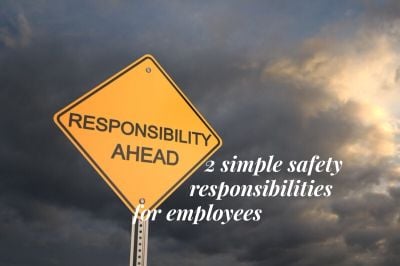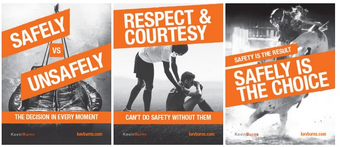2 Simple Safety Responsibilities For Employees
Employees who don't care about their job, don’t care about safely doing the job.
 There is a lot of talk of leadership on the job these days; specifically, safety leadership. Why? Employee leadership raises personal standards and contribution especially in safety. Leadership is an attitude. People who own the attitude of personal leadership do better, conscientious work.
There is a lot of talk of leadership on the job these days; specifically, safety leadership. Why? Employee leadership raises personal standards and contribution especially in safety. Leadership is an attitude. People who own the attitude of personal leadership do better, conscientious work.
Old-style, top-down management is fast becoming ineffective and giving way to teams, mentoring and coaching. Involvement is key to shifting the safety paradigm. Managers telling employees what to do is outdated. Companies are coaching employees to voluntarily step up their personal safety leadership capacity.
Companies are attempting to improve employee safety buy-in. As a result, there is much discussion on responsibility and accountability. Personal leadership capacity in safety is the next level of safety engagement. Disengagement levels hover around 70%. Companies are attempting to fight back to help their people engage.
It is difficult to inspire employees to care about the work when supervisors lack the basic management skills. Unfortunately, companies put people into supervisory roles but offer no skills development. But that's another argument.
Employees who don't care about their job, don’t care about safely doing the job. But, when engagement activities increase, there is the hope that employees improve their engagement levels. A key piece to safety engagement and safety leadership rests squarely on the shoulders of employees.
There are two simple responsibilities that employees have in the job. Everything else is simply an offshoot of either of these two responsibilities:
1Honor your agreements. Especially the big one; the one that got you here. Your employer has agreed to pay you for an honest day's work. The company continues to uphold their end of the bargain (training and paycheck). You should be upholding your end of the deal (hint: that would be the work part). Showing up late, giving a half-assed effort and taking safety shortcuts is not upholding your end of the deal. But the company is still expected to uphold theirs aren't they? Employers, by law, must continue to pay the employee regardless of the quality of effort shown by the employee. Until the employee has been terminated of course. Things would be different though if the company could shave a few dollars from an employee’s paycheck if they felt they weren't getting full value. So, employees, honor your agreement; the one you made when you took the job.
2Show up Fit For Duty. Ensure that you are rested, relaxed and ready (100%) to take on the tasks assigned to you. That means not being drunk, hung over, high or otherwise distracted. Be the person who was at the original interview when your employer asked, “why should we hire you?” You gave an answer that caused your employer to determine that you were the best choice out of all of the candidates. So be that guy. You likely didn’t interview hungover or drunk or high. You showed them what you were capable of. You showed them character. It impressed them enough to hire you. So, be that guy. That’s the one they hired and the one they expect to show up each day. Showing up unfit for duty also speaks volumes about your level of caring and concern for your fellow employees. You wouldn’t put your child on a school bus with a driver who was either drunk, high, hung over or fatigued. But it’s OK to do that to your fellow workers?
*One more responsibility that needs to be mentioned. If there are co-workers guilty of not keeping their responsibilities, the rest of the staff must address the issue. The offender needs to know that they will not be allowed to abuse the company or impact the workload of the rest of the staff. If other staff members, their peers, confront the offender, it won’t likely happen again. A well-placed word to a supervisor or safety manager can also speed things along. The culture of “how we do things ‘round here” is powerful. Safety is too important to take lightly. Bad behavior on the job increases risk exposure.
 Employees have serious responsibilities in safety. But they’re easy to accomplish. It starts with good decisions and being a person of character. Good behaviors follow good decisions.
Employees have serious responsibilities in safety. But they’re easy to accomplish. It starts with good decisions and being a person of character. Good behaviors follow good decisions.
Kevin Burns is a management consultant, safety speaker and author of "The Perfect Safety Meeting" and his newest #1 Amazon Health & Safety Bestseller, "Running With Scissors - 10 Reasons To Invest in Safety In Slow Times." He is an expert in how to get through to people - how to talk with them so they hear and understand. Kevin's presentation "Trust The Process - Instill A Safety Attitude To Build An Engaged Culture Of Safety" will help your organization reach the following goals: better engagement and buy-in to safety, increased teamwork, better communication, lower turnover resulting in increased profits from production. Click here for more information and to discuss your needs with Kevin.
(c) Can Stock Photo


